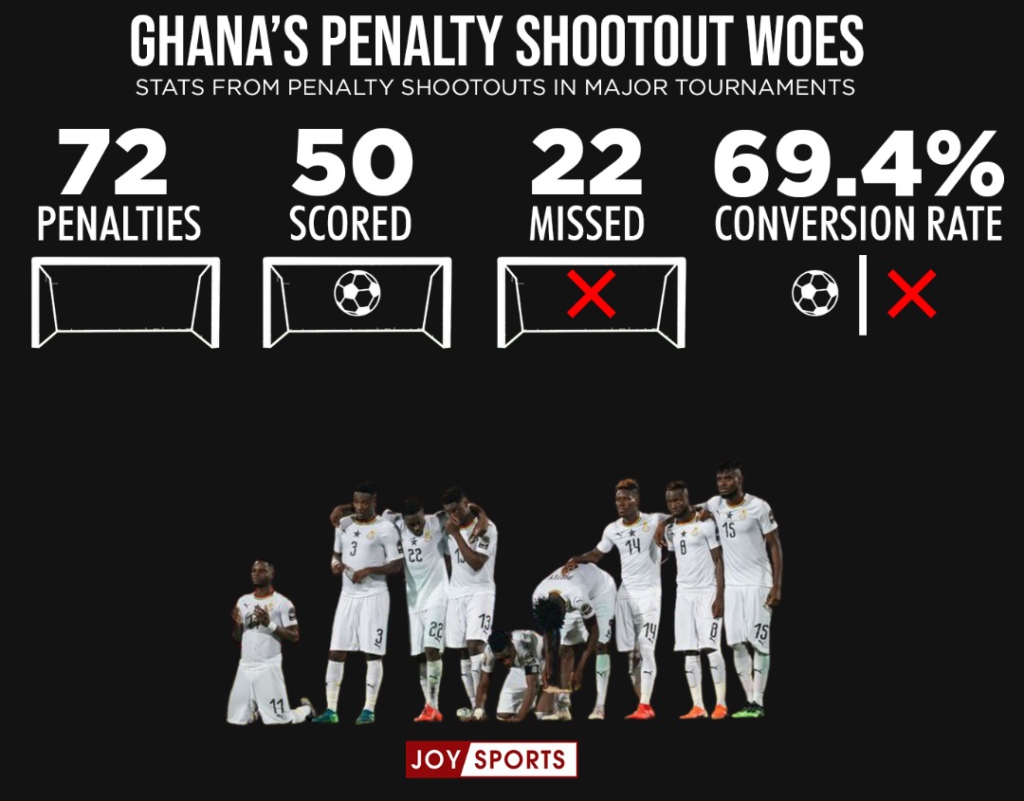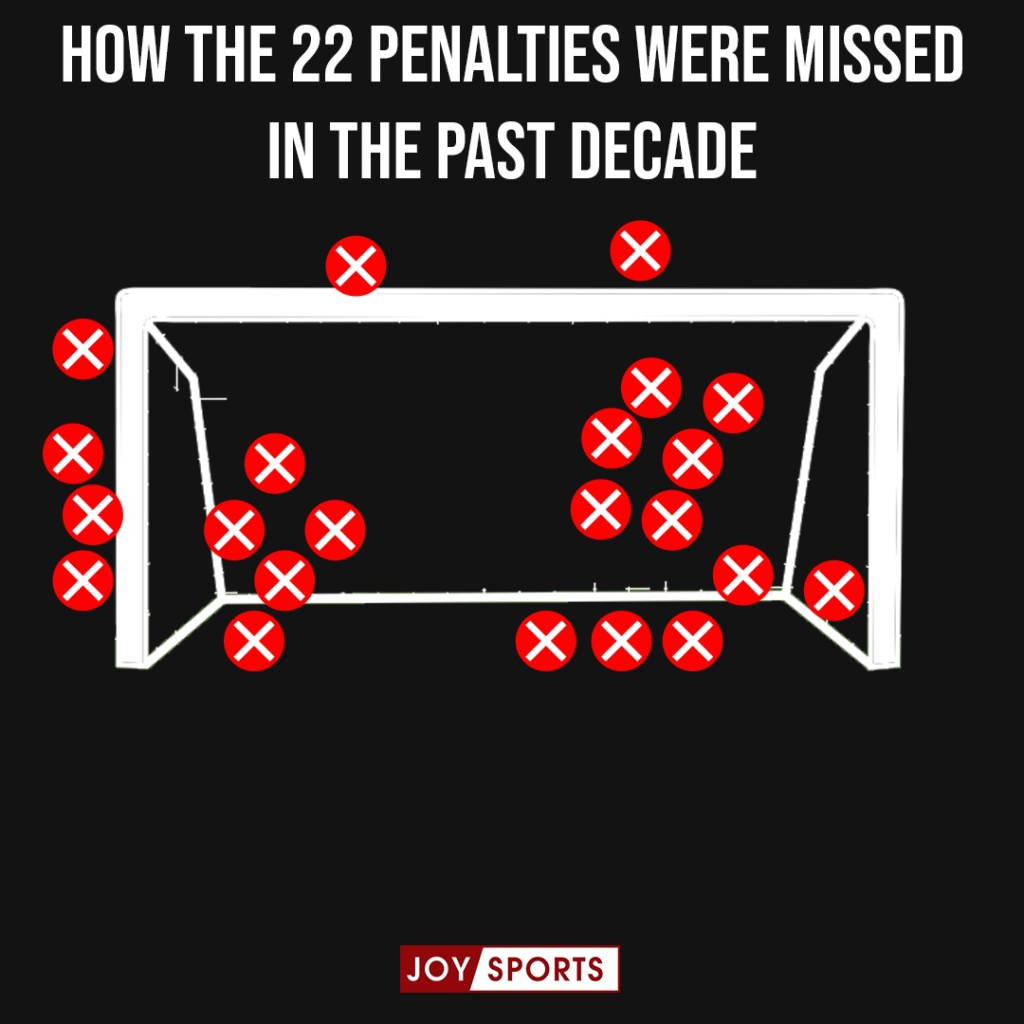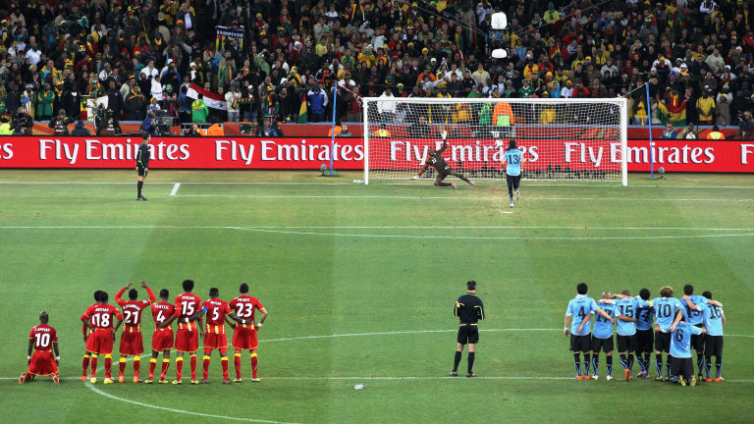
Audio By Carbonatix
There was a time when Ghana was referred to as a kingpin in African football. Four Africa Cup of Nations (AFCON) titles in the space of 19 years (1963-1982) is a remarkable achievement considering the fact that the tournament was played every two years.
To put things in perspective, the Black Stars won four titles in nine AFCON tournaments.
However, what followed was a period of “almost-achieving”. Making eight semi-finals and losing three finals has left Ghana staring down the barrel of the African football giants label.
Two of the three finals lost by Ghana since 1982 were as a result of penalties. Falling to a penalty shootout is not a problem suffered by the Black Stars in isolation, the other subsets of the Ghana national team such as the Black Meteors, Black Maidens and Local Black Stars have all undergone similar fortunes from 12 yards.
Speaking at the official launch of the juvenile league, Ghana Football Association president Kurt Okraku admitted there is penalty problem in Ghana football.
"For so many years, Ghana has suffered a lot from our inability to score at the penalty spot when games end in stalemates. The Black Stars we remember Senegal 92 which is just one of the key examples.”
The Penalty Problem
Narrowing the sample period to the past 11 years, the Black Meteors, Black Maidens, Black Satellites, Black Stars and Black Stars B have played a combined 72 penalties spreading across 13 different penalty shootouts (AFCON, U-23 AFCON, WAFU, U17 Women’s World Cup, U-20 AFCON).

Out of these shootouts contested, only four were won; two by the Local Black Stars – against Nigeria in 2014 and Burkina Faso in 2019, both CHAN tournaments and the other two by the Black Satellites - against Niger in the 2020 WAFU Zone B and Cameroon in the U-20 AFCON.
Nine penalty shootout defeats spell out the degree of the penalty problem in Ghana.
With the Black Stars and Black Stars B losing finals in the 2015 AFCON and WAFU 2019 on penalties respectively, it is fair to say that Ghana’s trophy cabinet will be at least two trophies heavier if the shootout issues were addressed.
In a different context, a conversion rate of 69.4% would not look so bad. However, with reference to penalties, the margins are usually microscopically tight. Therefore, missing 22 penalties out of an attempted 72 shows a lack of conviction.
The Expected Goals (xG) for a penalty is 0.76, meaning a player has a 76% chance according to historical data. Juxtaposing the mean success rate from penalties to Ghana's conversion rate highlights under-performance.
The 22 Penalties Missed
Six out of the 22 penalties missed have been off-target but that suggests the attempt to be more precise. The best penalties are usually placed in the corners because it is difficult for goalkeepers to react quickly.

The off-target attempts were the closest to the corners in terms of positioning. The remaining 15 penalties were placed in a rather more comfortable zone for the keeper because they were relatively central. The more worrying observation is the height of these central penalties.
Choosing to go mid-range makes it easier for goalkeepers because they do not have to outstretch themselves to make contact. Aiming for the roof, is perhaps the best option when going central but that comes with some form of composure which Asamoah Gyan (against Uruguay) and Edward Sarpong (against South Africa) did not have.
The juvenile solution
Okraku at the launch of the juvenile league went ahead to propose a solution to the penalty problem.
“So beginning this season, all juvenile games that end in stalemates will be decided via penalty shootouts. So what that means is that when the game ends in 0-0, 1-1 or 3-3 we’ll resort to the penalty shootout to decide the winner. The winner gets 2 points while the losing team one.”
This is a good initiative because teams will be forced to make time to practice penalty kicks. Most importantly, these young players will grow up not scared of penalties.
Penalties are an art and a science and the only way to master them is through familiarization and mental fortitude.
It's these same juvenile players who will one day grow to play in the national teams to help solve Ghana's penalty problem.
Latest Stories
-
A stitch in time saves nine: The cry of local businesses – It is now or never
15 seconds -
Mrs Stella Owusu Aouad
53 seconds -
How Ceejay’s Next Gospel Star became Ghana’s most purpose-driven talent factory
4 minutes -
Recovery on paper, doubt on the ground: BoG data shows Ghanaians still unsure despite major gains
5 minutes -
Tamale high court delays ruling in Anbariya vs. Technical University case
6 minutes -
Western Regional House of Chiefs inducts Shamamanhene as member
7 minutes -
GHAMRO distributes GH₵856,700 December royalties
8 minutes -
Black Queens are ‘doing extremely well’ – Björkegren on 2025 year review
9 minutes -
Act 1122 reshapes GSA as Prof Gyampo outlines tough discipline, cost reforms and 2026 priorities
13 minutes -
Ghana gets $10.5m for qualifying for World Cup 2026
15 minutes -
GHAMRO explains GH¢123.82 royalty payment to Fancy Gadam
16 minutes -
PPI for November 2025 falls to 12.3%
16 minutes -
Techiman police arrest 25 in major swoop; drugs seized
23 minutes -
Love in marriage goes beyond sex – Rev. Daniel Annan
24 minutes -
GSA records major regulatory, infrastructure gains under Prof. Gyampo’s leadership
24 minutes

